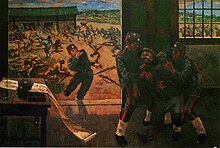|
Park Seung-hwan
Park Seung-hwan (Korean: 박승환) was a Korean military officer and independence activist of the Korean Empire. After his suicide, he was known for instigating the Battle of Namdaemun as a response to the disbanding of the Korean military following the Japan–Korea Treaty of 1907 and the abdication of Emperor Gojong. Biography He was born on September 7, 1869, in Hanseong, Gyeonggi as the eldest of three children of Park Joo-pyo and Namyang Hong.[1] In 1887, he took the exam in Mugwa and on September 28, 1896, he entered the Military Academy of Korean Empire.[2] Yi Hak-gyun, the academy principal, was a nationalist who opposed Japanese influence, which influenced Park's beliefs.[3] He graduated on March 21, 1897, and was commissioned as a Second-Lieutenant in the Imperial Korean Guards. Afterwards, on November 11, 1899, he was promoted to the rank of lieutenant in the army and was appointed as the platoon commander of the 2nd Battalion of the 1st Siwi Regiment and on July 23, 1900, he was promoted to the rank of captain and took the command of the 1st company of the 1st Qinwi Regiment. Then on 14 August 1900 he took the command of company leader of the 1st Siwi Regiment. On 15 February 1904, Park was promoted to Major and became the 1st Battalion leader of 1st Siwi Regiment.[3][4] While serving as the 1st Battalion Commander of the 1st Siwi Regiment, he entered the palace when Emperor Gojong was forcibly taken away by the Japanese in 1907 and attempted to restore the throne, but he stopped because he was afraid of harming King Gojong. On August 1, 1907, he gathered officers above a battalion commander or higher at the Japanese military headquarters to disband the army. Park then committed suicide with a pistol and wrote a suicide letter which read:
When Park's suicide became known, some of the soldiers of the 1st Chamryeong under him became enraged and started an anti-Japanese uprising, which led to the Battle of Namdaemun.[2] After the uprising was put down, the Imperial Japanese government defamed Park's suicide.[1] In 1909, An Jung-geun assassinated Itō Hirobumi at Harbin Station to avenge Park's death. LegacyAfter his death, in 1962, he was posthumously awarded the Presidential Order of Merit for National Foundation by the Government of South Korea.[2][5][6] In August 2003, he was selected as a national figure of South Korea.[6] FamilyPark had a son, Park Jeong-hup, and two grandchildren, Park Dae-jong and Park Wang-jong.[7] In popular cultureHis statement and act of suicide are portrayed in the 2018 South Korean TV series, Mr Sunshine, as is the Battle of Namdaemun. References
Bibliography
|
||||||||||||||||||
